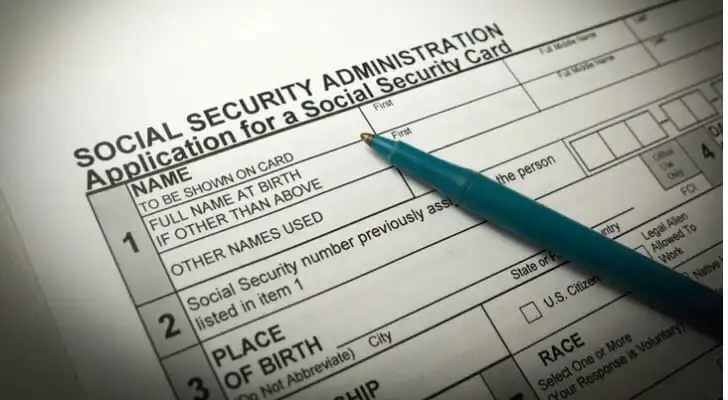If you’ve ever applied for a credit card or completed a job application, you’ve probably been asked for your Social Security number. This unique nine-digit number issued by the Social Security Administration is one of your most important pieces of identifying information. There are various ways your Social Security number is used and several important reasons why you need to have one. If you’ve ever wondered what the purpose of these numbers is, how they’re assigned or how to make the most of your Social Security number, here’s a closer look at how they work.
Social Security Number, Definition
A Social Security number is a unique nine-digit code that’s used to identify you and track your earnings over the course of your lifetime. These numbers were first introduced in 1936 as a means of tracking earnings histories for U.S. workers. According to the Social Security Administration, more than 450 million Social Security numbers have been issued and there are more than 420 million numbers that are available for assignment.
Social Security numbers can be issued at birth by the Social Security Administration. They also are available to legal residents.They’re printed on a paper card and mailed to you. Social Security numbers have three components:
- Area Number: This is the first set of three digits.
- Group Number: This is the second set of two digits.
- Serial Number: This is the third set of four digits.
Your area number is assigned by your geographic region. This is based on the zip code that’s used to apply for a Social Security number and doesn’t necessarily represent where you were born or where you live.
The group number corresponds to your area number and can range from 01 to 99. These numbers are assigned on an odd/even basis. The serial number is a set of four digits ranging from 0001 to 9999.
Starting in 2011, the Social Security Administration opted to randomize Social Security number assignments. The most notable change is that the area number no longer has any geographic significance based on where you live.
Social Security Numbers, Social Security Benefits
 Social Security numbers were first created to track earnings for workers to help with determining the Social Security benefits they’d be entitled to receive once they retired. That’s still a primary function of Social Security numbers today. Social Security benefits are typically calculated using your average indexed monthly earnings which takes into account up to 35 years of earnings.
Social Security numbers were first created to track earnings for workers to help with determining the Social Security benefits they’d be entitled to receive once they retired. That’s still a primary function of Social Security numbers today. Social Security benefits are typically calculated using your average indexed monthly earnings which takes into account up to 35 years of earnings.
So, if you get your first job at age 16, for example, then the Social Security Administration starts tracking your earnings history from that point. Your actual earnings are adjusted or indexed to account for changes in average wages over time. The Social Security Administration uses these adjusted wages to calculate your basic benefit, which is the amount you’d receive once you reach full retirement age.
Full retirement age is based on the year you were born. For someone born in 1960 or later, that’s 67. If you wait until full retirement age to receive benefits, you’ll receive the full benefit amount you’re eligible for. But you can technically begin taking Social Security retirement benefits at age 62. Doing so, however, will reduce your benefit amount. On the other hand, you can delay taking Social Security benefits up to age 70, which can increase your benefit amount.
Other Uses for Social Security Numbers
Aside from Social Security benefits, there are other ways your Social Security number can be used. For example, you’ll typically need a Social Security number if you want to:
- Open a bank account in your name
- Apply for federal or private student loans
- Get a credit card in your name
- Apply for a home loan or auto loan
- Apply for a job
- Qualify for state or federal benefits or financial assistance
- Get a passport
- File your taxes
- Get a driver’s license
You may also need to provide your Social Security number when applying for cell phone or utility services in your name, renting a car or signing a lease on an apartment. That’s because of the way Social Security numbers are used for credit scoring.
Your credit score is a three-digit number that’s based on the information in your credit reports. This information is reported to the credit bureaus by your lenders or billers. Credit reports include both financial information, such as account activity, as well as personal information. One of the key pieces of personal information used to identify you for credit reporting and scoring is your Social Security number.
Your entire credit history is tied to that number, which is why it’s so important to protect it. If someone were to obtain your Social Security number and other pieces of personal information, such as your date of birth, it’s possible that they could open fraudulent credit cards, loans and other accounts in your name. Identity theft can be stressful to resolve and it can cause serious credit score damage if someone runs up sizable debts in your name.
You can protect your Social Security number by:
- Keeping your Social Security card in a secure place, such as a home safe or safe deposit box at your bank
- Keeping any physical documents that include your Social Security number in a secure place
- Encrypting digital documents stored on your computer or phone that include your Social Security number
And be cautious about who you share your Social Security number with. Consider carefully before sharing your number over the phone or via email with anyone you don’t know without first verifying that it’s a trusted source. So if your bank emails you asking for your Social Security number, for example, call the bank directly first to make sure the request is legit.
How to Get a Social Security Number
To get an original or replacement Social Security number and card for a U.S.-born citizen, you’ll need to fill out an application with the Social Security Administration and provide supporting documentation. That includes:
- An original birth certificate (photocopies are not accepted)
- A U.S. passport or official hospital record of your birth if you don’t have a birth certificate
- Official ID, including state-issued ID cards, military ID cards, school ID cards or health insurance ID cards
If you’re applying for a Social Security number for a child, acceptable forms of ID include:
- Doctor, clinic or hospital record
- Official birth certificate
- Adoption decree
- School identification card/record
- Daycare records
- Religious records
You also have to provide proof of your own identity. There is no fee to get a new or replacement Social Security card. You can take your application to your local Social Security office to complete the process. Online applications are accepted but only if you’re 18 or older with a U.S. address and a state-issued ID. You can apply online through your My Social Security account.
The Bottom Line
 Your Social Security number is a unique nine-digit number issued by the Social Security Administration. It plays an important part in your everyday and financial life when it comes to things like getting a job, credit approvals and retirement benefits. Knowing your Social Security number – and how to keep it safe – matters when managing your finances in the short- and long-term.
Your Social Security number is a unique nine-digit number issued by the Social Security Administration. It plays an important part in your everyday and financial life when it comes to things like getting a job, credit approvals and retirement benefits. Knowing your Social Security number – and how to keep it safe – matters when managing your finances in the short- and long-term.
Tips for Investing
- Consider talking to your financial advisor about Social Security benefits and where they fit into your retirement plans. If you don’t have a financial advisor yet, finding one doesn’t have to be complicated. SmartAsset’s financial advisor matching tool can help. By answering a few brief questions online, you can get personalized recommendations for advisors in your local area. If you’re ready, get started now.
- Social Security planning is important, especially if you’re married or you’re unsure when you should begin taking Social Security benefits. Married couples have different options for maximizing their benefits, based on each spouse’s earnings history. While taking benefits early could provide much-needed income for retirement, you could reap a larger benefit by waiting longer to file for Social Security.
Photo credit: ©iStock.com/DNY59, ©iStock.com/DNY59, ©iStock.com/Enigmangel
